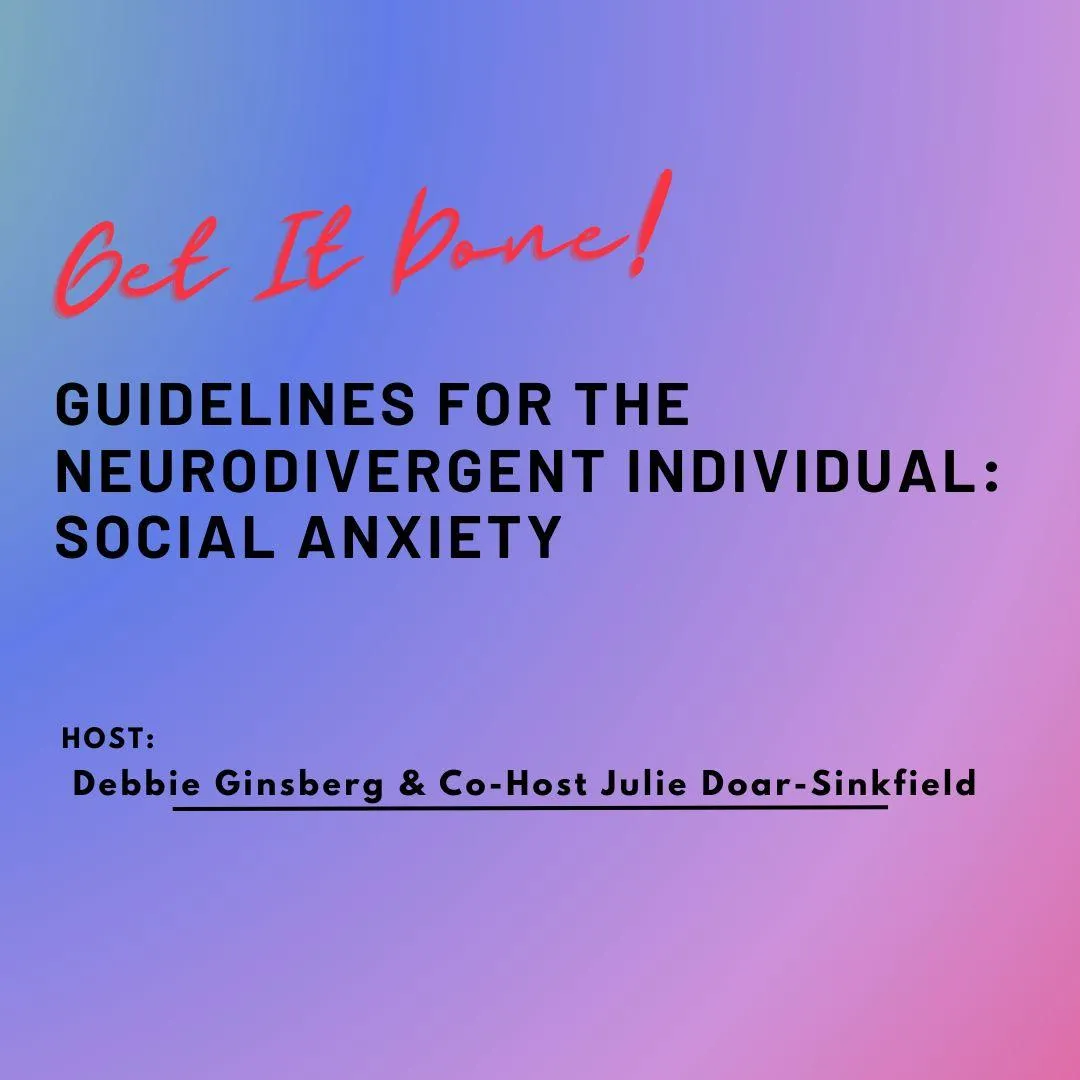My Life Tutors Blog
Learn more about our Life Tutoring services
and the motivations behind our work
My Life Tutors Blog
Learn more about our Life Tutoring services and the motivations behind our work

Episode 2: Get It Done! Guidlines for Neurodivergent Inidividuals
Understanding Social Anxiety: Exploring Episode 2 of "Get it Done! Guidelines for the Neurodivergent Individual" Podcast
In the world of podcasts, insightful and informative content is abundant, addressing various topics and catering to diverse audiences. One such podcast that deserves your attention is "Get it Done! Guidelines for the Neurodivergent Individual" by Julie Doar-Sinkfield and Debbie Ginsberg. In their second episode, they delve into the intriguing concept of Social Anxiety Disorder (SAD) and explore the factors contributing to its rise in today's world. Join us as we uncover the key takeaways from this thought-provoking episode and gain valuable insights into the world of neurodiversity.
The Concept of Social Anxiety
Before delving into the specifics of Social Anxiety Disorder, it's crucial to understand the fundamental concept of social anxiety. Often, people use the terms "anxiety" and "social anxiety" interchangeably. However, as Julie and Debbie clarify in this episode, they are distinct phenomena.
Social Anxiety Disorder (SAD)
Social Anxiety Disorder, commonly referred to as SAD, is a mental health condition characterized by an overwhelming fear of social situations. It goes beyond the typical nervousness one might feel before a social gathering and can significantly impact an individual's daily life.
Contributing Factors to SAD
Rise of Social Media: The episode highlights how the ubiquity of social media platforms has contributed to the rise of SAD. The constant comparison with curated online personas can exacerbate feelings of inadequacy and anxiety.
Survival: Julie and Debbie discuss the evolutionary aspect of social anxiety, explaining that it may have roots in our survival instincts. Being cautious in unfamiliar social situations could have been advantageous for our ancestors.
Pandemic: The COVID-19 pandemic, which disrupted our social norms and forced physical distancing, is also cited as a contributing factor. The increased isolation during lockdowns exacerbated feelings of social anxiety for many.
MyLifeTutor: A Tool for Independence and Confidence
Julie introduces MyLifeTutor, a tool designed to help individuals become more independent and confident. It's a valuable resource, particularly for neurodivergent individuals struggling with social anxiety. By providing guidance and support, MyLifeTutor empowers users to navigate the complexities of daily life with confidence.
Empathy for People with SAD
Julie and Debbie express deep empathy for individuals dealing with SAD. They recognize the challenges and stigmas associated with the condition, emphasizing the importance of understanding and support.
Gaming and Esports: Unconventional Solutions
Interestingly, the podcast touches on how gaming can serve as a coping mechanism for some people with social anxiety. The sense of community and camaraderie within online gaming communities can offer a supportive space for those who find traditional social interactions challenging. Additionally, the hosts delve into the world of esports, highlighting how it has gained popularity as a legitimate profession and source of connection for many.
The Impact of Not Fitting In
Not fitting in or feeling like an outsider can be a significant source of anxiety. The episode explores how this feeling of not belonging can contribute to social anxiety, particularly in professional and dating contexts. Interestingly, the hosts note that women are more likely to qualify for SAD in professional settings, while men may experience it more acutely in the context of dating.
Aging and SAD
A clear trend discussed in the podcast is the increase in SAD with age. This is a crucial point as it challenges the misconception that social anxiety is primarily a condition affecting adolescents and young adults.
Emotions of Neurodivergent People with SAD
Debbie sheds light on the emotional experiences of neurodivergent individuals dealing with SAD. Understanding these emotions is essential for providing effective support and guidance.
Mentoring and Coaching as Complementary to Therapy
Julie emphasizes how mentoring and coaching can complement traditional therapy for individuals with SAD. These additional forms of support provide practical strategies for navigating social situations and building self-confidence.
The Impact of COVID-19
Julie contends that the COVID-19 pandemic has played a significant role in the increased prevalence of SAD. The isolation, uncertainty, and disruption of routines have all contributed to heightened anxiety in social contexts.
In a poignant conclusion, Julie and Debbie reflect on life as a journey. They emphasize the importance of empathy, support, and self-discovery in the quest for personal growth and well-being.
Episode 2 of "Get it Done! Guidelines for the Neurodivergent Individual" offers a wealth of insights into the complex world of Social Anxiety Disorder. Julie Doar-Sinkfield and Debbie Ginsberg guide us through the contributing factors, personal experiences, and coping mechanisms associated with SAD. Their empathy and commitment to supporting neurodivergent individuals shine through, making this podcast episode a must-listen for anyone seeking to understand and address social anxiety in today's society.
. . . Take the First Step . . .
Ready to Transform Your Life?
Reach Out and Let's Chat!

Hours of Operation:
M-F 10 am - 5pm EST/1PM - 8PM PST
Rockfield Road
Windsor Mill, MD 21244
Serving the Continental United States